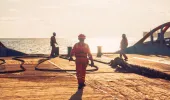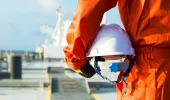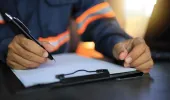Seafarers employed on ships must have a seafarer medical fitness certificate, which in the UK is an ENG 1. Fishermen working on vessels over 24 metres, or normally remains at sea for more than 72 hours, or operates more than 200 miles from the coastline of the UK or beyond the Continental Shelf, or is subject to inspection in a foreign port also require an ENG 1.
The certificate confirms that they are medically fit to work on sea-going ships and they do not have a medical condition that could be a danger to other crew, passengers or the vessel.
A seafarer or fisherman who is considering a career at sea should check the medical standards before starting their training, to avoid wasted time and expense, if they are found to have a medical condition which will make them unfit to work at sea. The medical standards are published in MSN 1886 Amendment 1 MLC and ILO 188 medical standards.
How an ENG 1 is issued
ENG 1 certificates are issued by the network of MCA approved doctors in the UK and overseas. They are issued for a maximum of 2 years if the seafarer or fisherman is medically fit. An unfit seafarer or fisherman may put themselves at risk if they are not medically fit to perform their duties.
Regulations require you to notify the Maritime and Coastguard Agency (MCA) of any changes to your medical fitness during the validity of the ENG 1.
Payment for an ENG 1
The current fee for an ENG 1 is £115 and if you are employed in the UK, your employer will pay this; the limit is set in UK regulations.
If you need any extra tests (like a step test), the approved doctor can charge more, and this must be agreed with whoever is paying for the ENG 1 before you have the test(s).
Medical assessment
What will you need to bring to the medical assessment?
- Photographic ID such as passport, driving licence, discharge book
- Previous medical fitness certificate
- Name and contact details for own GP
- Any medicines that have been prescribed
- Glasses or contact lenses (including spare sets)
- Any medical reports and letters
Additional tests, for example physical fitness, blood tests, colour vision and audiometry are included as part of the assessment.
Seafarers and fishermen must inform the approved doctor if they have been issued with a Notice of Failure or Restriction, a final failure certificate or if, for any reason they have failed to complete the medical assessment.
At the end of the assessment the approved doctor will issue a certificate of fitness, which will certify and specify one of the following:
- Fit without restriction
- Fit with restrictions, such as a certificate limiting work to certain jobs or localities
- Temporarily unfit
- Permanently unfit
Requesting an independent medical review
If a seafarer or fisherman is found to be unfit, a restricted certificate is issued, and the approved doctor will give a Notice of Failure or Restriction (ENG 3); this will advise how to seek a review of the decision.
Any seafarers and fishermen who are aggrieved by the decision and would like to request an independent medical review can do so by posting the ENG 3 received to the Medical Administration Team. You would need to ask for a referral to one of the MCA's Independent Medical Referees within one month of the original decision.
The medical referee will assess the original decision to decide if it was made in sound terms of the application of the medical standards and the diagnosis; they may then issue a revised medical certificate. The independent referee will assess the medical fitness certificate in relation to the legal standards and their decision on the fitness of the seafarer or fisherman is final.
The cost of the Independent Medical Review, including any additional reports will be met by the Maritime and Coastguard Agency, however, travel costs to the Independent Medical Referee will be at the seafarer, fisherman’s, or their company’s expense.





